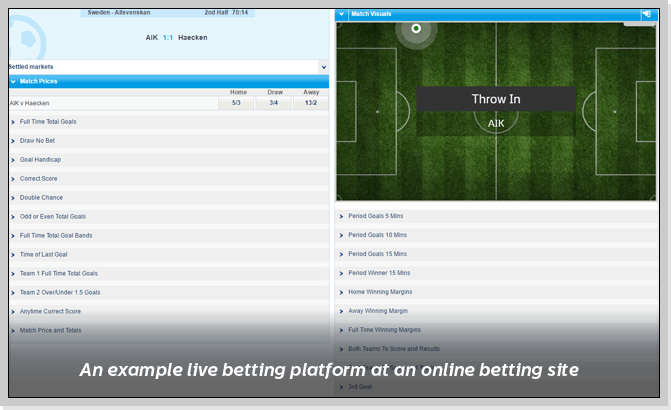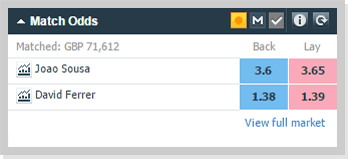
Wikipedia describes sports betting as “the activity of predicting sports results and placing a wager on the outcome.” While that does accurately describe what sports betting is all about, the term sports betting is actually quite vague. It covers a multitude of different (but related) activities, and it can be applied to any type of wager associated with sporting events. Fixed odds betting may be the most popular way to bet on sports, but it’s certainly not the only way.
Some types of sports betting are relatively new. The internet hasn’t only changed the way that most of us place our wagers, it’s also opened up new possibilities for alternative types of wagering. Other types have been around for a lot longer, and some have even been around longer than the internet itself.
In this section of our sports betting guide we’ve provided information on several popular types of sports betting. We start with a brief explanation of fixed odds betting: the traditional way to bet on sports. Then we move on to in play betting, also known as live betting, which has become a standard form of wagering at most online betting sites. After that we move on to exchange betting: a new form of placing wagers that doesn’t even involve a bookmaker.
Spread betting is next; although this has been around for a while, it’s not as well known as the other types. Then we discuss daily fantasy sports. Although this is technically not a form of wagering at all, it does involve risking money for the chance of winning money. And it’s sports based, so it fits here in our opinion. After that we move on to pari-mutuel betting, which has been around for well over a century. We finish with e-sports betting: a very recent development in sports gambling that is just starting to take off.
Already know what type of sports betting you’re interested in? Then use any of the buttons below to jump ahead to the relevant section.
Fixed Odds Sports Betting
The majority of our sports betting guide relates to fixed odds sports betting. This is the traditional form of sports gambling, and it’s the one that most people are familiar with. They’re not necessarily familiar with the term “fixed odds” though. This term means that both parties agree on the odds when a wager is being placed. When a wager wins, it is paid out at those agreed odds even if the odds have subsequently moved.
Fixed odds sports betting is very straightforward. In simple terms, it’s where you wager on what’s going to happen in a sports event. It’s possible to place a wager on which team will win a football match, for example, or on which player will win a tennis tournament. If you pick the right team or player, your wager wins and you get paid out.
While that’s a good overview of what fixed odds sports betting is all about, there is a little more to it than that. There are all kinds of different wagers that you can place, for example, and all kinds of different things you can bet on. If you’re new to sports betting in general, and would like to learn more about fixed odds betting, then you should start with the following section of our guide.
In Play/Live Betting
In play betting, or live betting, is a form of fixed odds betting. Even though wagers are placed on sporting events at fixed odds in the same way, there is ONE significant difference.
You bet on events AFTER they’ve started.
Remember: when it comes to traditional betting, wagers must be placed before the start of an event. Live betting follows a different set of rules, however, as it’s possible to place a wager any time during the event, right up until the event is about to be over.
This form of betting is relatively new. It’s been around for a few years now, but it only became possible thanks to the power of the internet. Despite the fact that it’s only available online, it is incredibly popular. Most gambling sites offer a live betting platform these days, and they typically cover a wide range of different sports and events.
As you can see from this screenshot (for a soccer game), there are many different types of wagers available when betting in play. The traditional wagers are still available, such as which team will win the match, but the odds for these change as the game or event progresses.
In our opinion, one of the most appealing advantages of live betting is the fact that it opens up a whole new range of betting opportunities. Many of these wagers wouldn’t be possible with traditional betting. Two examples of this are wagers on which team will score next, or wagers on which player will score next. The precise markets available varies from one site to the next, and also depends on which sports or events you’re gambling on.
Another advantage of live betting is that you can get a feel for how an event is turning out before deciding which wagers to place. This makes it a little easier to gain an edge over the bookmakers. There are other advantages too, and we explain them all in our guide to live sports betting.
This guide also explains more about exactly how in play betting works. We look into the qualities of good live betting sites and make some solid recommendations. We even provide some strategy advice as well.
Exchange Betting
Exchange betting is another relatively new development in the world of sports gambling that has grown in popularity in recent years. A lot of people choose to use betting exchanges for most of their wagers these days, and some do all their wagering this way.
The wagers you can place at an exchange are essentially the same as in traditional sports betting. The odds are fixed at the time of placing your wager too, but there is one major difference in the way exchanges work.
There is no bookmaker involved.
That’s right, exchange betting doesn’t require the services of a bookmaker. Instead, all wagers are placed between bettors. So every time you place a wager, you’re basically gambling with other people who are taking the opposite position as you.
Let’s use an example to clarify how this works. If you were looking to place a wager on an upcoming tennis match between Joao Sousa and David Ferrer, then the exchange market found below is what you could expect to find.
At a normal betting site, there would only be one set of odds for each of the two players. But, as you can see, here we have TWO sets of odds for each player. Look carefully and you’ll notice that one set is labelled “back” and the other is labelled “lay.”
These odds represent wagers that other people have already proposed. If you chose to back Ferrer at 1.38, you’d effectively be making a wager with someone who had chosen to lay Ferrer at those odds. That person would be backing AGAINST Ferrer winning. Instead of simply backing Sousa to win, they’ve decided to lay Ferrer.
Laying a wager ultimately means taking on the role of the bookmaker. So the person you’re wagering with in the example above is giving you odds in the same way a bookmaker would. If you win the wager, he has to pay you out based on those odds. But if he wins, he gets to keep your initial stake.
One of the functions of a betting exchange is to handle the whole financial side of things. So when you place your wager, you pay your stake to the exchange. The person who’s laying your wager has to pay over the potential payout. When the wager is settled, the exchange keeps a small commission and pays the relevant sum to whichever party has won the wager.
We understand why this may sound a little confusing, but trust us when we say that it’s really not. Once you fully understand how everything works, we promise that you’ll see just how simple it really is. Anyone who needs a more detailed explanation of exchange betting should consider reading the guide we have listed below. This guide includes useful tips and strategy advice too, so it
will be well worth your time!
Spread Betting
Please don’t confuse spread betting with POINT spread betting. The latter is not really a type of sports betting in its own right, but a specific wager that can be placed when fixed odds betting. The point spread wager is very popular, especially in America, but it’s not what we’re referring to here. If you’re interested, feel free to read more about it in our page on the various types of wagers.
When we refer to spread betting as a type of betting, we’re talking about a specific form of wagering that’s completely different to fixed odds betting. It’s nowhere near as popular, and it’s somewhat more complicated. Not only are odds irrelevant with this type of wager, but your stake is also not a fixed amount.
Spread betting is similar in some ways to totals betting, or betting the over/under. Totals betting involves predicting whether a specific value will be higher or lower than the amount set by a bookmaker. Let’s say we were betting on the total number of points scored in a game of basketball for example. The bookmaker might set the total at 191.5. If we decided to back the over, we’d be predicting the total to be 192 points or more. If we decided to back the under, we’d be predicting the total points to be 191 points or less.
Our prediction would be either right or wrong.
The outcome will be clear, no matter what happens. When we’re right, we get paid out at whatever the odds were at the time of placing our wager. When we’re wrong, we lose our stake.
With spread betting, wagers aren’t settled based simply on whether we’re right or wrong. They’re settled based on HOW MUCH we are either right or wrong by. To explain this further, let’s take a look at how the spread betting market might look for total points scored in this basketball match.
The first thing you’ll probably notice is that there are two numbers. 190 and 192. This is called the spread. We have two options here. We can either BUY the spread at 192, or sell it at 190. Buying is the equivalent of backing the over, and selling is the equivalent of backing the under. Please keep in mind, though, we’re not fixed odds betting here.
When we place a wager on a spread betting market, we have to decide how much we want to stake PER UNIT. Our wins, or losses, are then determined by how far away the final total is from the spread. So if we bought at 192 for $10, we’d win $10 for every point scored above 192. 195 points would mean a $30 win. If we sold at 190 for $10, we’d win $10 per point below 190. 185 points would mean a $50 win.
This seems great right? We have the chance to win our stake back many times over, which is one of the biggest advantages that spread betting has to offer. On the other hand, the possibility of LOSING our entire stake many times over exists as well.
If we’d bought at 192 for $10, and the final total was lower, we’d lose $10 per point below 192. So if only 185 points scored, we’d lose $70. If we sold at 190 for $10, and the final total was higher, we’d lose $10 per point above 190. So if 195 points were scored we’d lose $50.
Spread betting can be EXTREMELY high risk.
Proceed with caution when spread betting, because racking up big losses from a single wager is way too easy. Even though there’s the potential for big wins too, this type of wager should not be taken lightly. It helps if you know what you’re doing. For more information, please read our detailed guide to spread betting.
Daily Fantasy Sports
As we mentioned in the introduction to this article, fantasy sports isn’t technically a type of betting. There’s no direct wagering on the outcome of sports events in any way. However, it does often get referred to as a type of betting. We decided to cover it here because it involves putting our sports knowledge to the test AND because it forces us to risk money in exchange for the chance of winning money.
OK, so what is fantasy sports all about then? Well, it involves drafting a fantasy team of real players, based on certain specified criteria, and then entering that team in a contest or league against teams drafted by others. Teams then earn points based on the how their drafted players perform in “real life.” In fantasy basketball, for example, a team will earn points when a player scores, assists, steals or blocks.
Where does the gambling come into it?
Fantasy sports have been around for many years, and they didn’t necessarily involve gambling at all. Groups of friends or colleagues would often have season long leagues where there was nothing at stake but pride. Many people still do this in fact, as there are still a number of websites that run free to enter fantasy leagues. These tend to also be run over entire seasons, and some may even give away prizes to the “owners” of the highest scoring teams.
Fantasy sports have revolutionized the way they do things in recent years. Online daily fantasy sports (DFS) has become incredibly popular. They work is pretty much the same way as traditional fantasy sports, but their contests are a lot shorter. Instead of being run over a whole season, they’re typically run over a single round of games. The gambling aspect comes in when you pay to enter a contest, for the chance of winning a percentage of the prize pool.
Several daily fantasy sports sites have opened up over the last few years, and some of the contests have hundreds of thousands of entrants. This means it’s possible to win large sums of money when playing DFS, often from a very small stake. There are many different types of contest, and most sites cover several sports. The sports listed below are by far the most common though.
- Baseball
- Basketball
- Soccer
Because of the popularity of playing daily fantasy sports, we’ve compiled a comprehensive guide to this type of “betting.” We compare DFS to traditional sports betting and to season long fantasy sports. We explain in detail how to play, provide information on all the different types of contest, and offer some very useful tips and advice for a better chance of winning. There’s lots more too, so if you’re interested in DFS please check it out.
If you end up getting into DFS, be sure to keep an eye on the play-casino-games-now.com blog. A couple of the guys on our team are very good at playing DFS, and they regularly make posts recommending some players to look out for.
Pari-Mutuel Betting
Pari-mutuel betting has been around longer than any other type of sports betting mentioned on this page, with the exception of fixed odds betting. It was invented in the late 19th century, by a man named Joseph Oller. Frustrated with the profit margins the bookmakers were making, he was eager to find a better way for people to place their wagers. His solution was pari-mutuel wagering, which removes the need for a bookmaker.
The basic principle behind his solution was a very simple one. There are some more complex aspects to it, such as the calculations involved, but overall pari-mutuel wagering is relatively straightforward. The idea is simply that everyone’s wagers on a specific betting market go into a “pool.” After the relevant event has taken place, and the wagers are settled, all the winning wagers are paid out of this pool. Because of the way this is set up, there are no odds involved.
Example:
For a very simple example, let’s say there were two possible outcomes. 100 people wagered $10 each on one “Outcome A,” and 50 people wagered $10 on the “Outcome B.” The total pool would be $1,500. If “Outcome A” won, then that $1,500 would be split among the 100 who backed that outcome. So each person would receive $15. If “Outcome B” won, then that $1,500 would be split among the 50 people who backed that outcome. So they’d receive $30 each.
Realistically speaking, everyone would wager different amounts, so the payouts wouldn’t be split equally. Payouts are calculated based on how much each person has wagered. If a person wagered $20, then they would receive twice as much as a person who wagered $10. That makes sense, doesn’t it?
There’s more to learn than just the basics we outlined here. In our guide to pari-mutuel wagering we explain how everything works in detail, and describe the different wagers that are available. We also briefly cover the history of pari-mutuel wagering, and look at how it’s used in different parts of the world.
E-Sports Betting
E-sports betting is the newest type of sports betting discussed on this page. It’s not related to sports in the traditional sense, but rather to an entirely new form of “sports.” Electronic sports, or professional video gaming, has seen a huge increase in popularity in recent years, and these days you can wager on competitions just like with traditional sports.
There have been organized video gaming competitions for many years. Even as far back as the 1970s, when video games were just starting to become popular. A lot has changed since then of course, including the introduction of the internet. Many gamers started playing online games, against other gamers from all over the world. Global e-sports tournaments are extremely common now, and they are available on a wide variety of different games.
The ones listed below are by far the most popular though.

Call of Duty

Dota 2

Counter Strike: Global Offensive

Hearthstone

World of Tanks

Starcraft II

League of Legends

Smite
Some of these games have been designed specifically with professional gaming in mind. There are others that include dedicated e-sports features too. For example, some games include a specific spectator mode so that observers can watch the action with a modified interface and additional information.
As e-sports has grown in popularity, several organizations and associations have been formed specifically to run professional e-sports gaming events and/or govern this emerging sport. These include the Electronic Sports League (ESL), the International E-sports Federation and the World eSports Association (WESA).
Most “official” e-sports events are held at venues in front of a live audience. This has helped to significantly improve the credibility of the sport, resulting in bigger audiences and more general interest. Sponsorships and prize money have increased too, giving e-sports more legitimacy as a professional sport.
As the interest in e-sports events continues to grow, it’s only natural that an interest in betting on these sports has also increased. Initially this was all done as “item” betting, with bettors wagering in-game items on the outcome of e-sports events. Real money e-sports betting is now widely available though, and has proved to be very popular. Anything you want to know about this new type of sports betting can be found in the guide listed below.


















